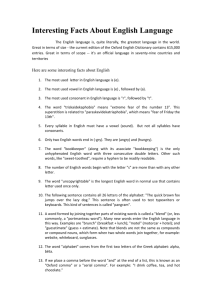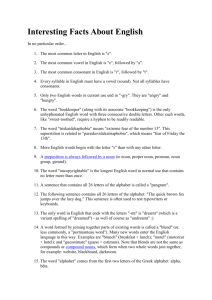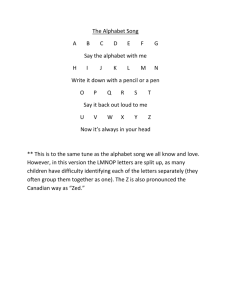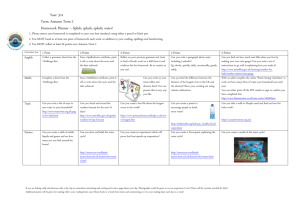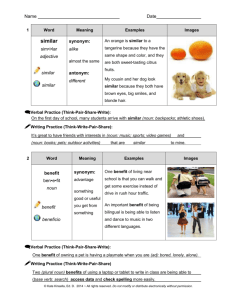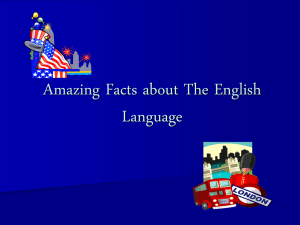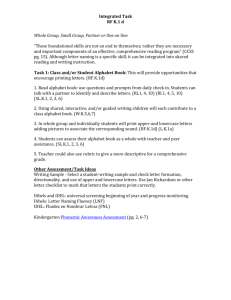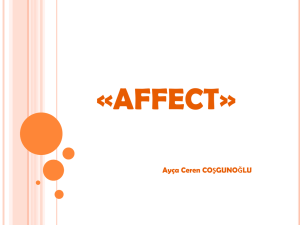Interesting Facts About English and other things
advertisement
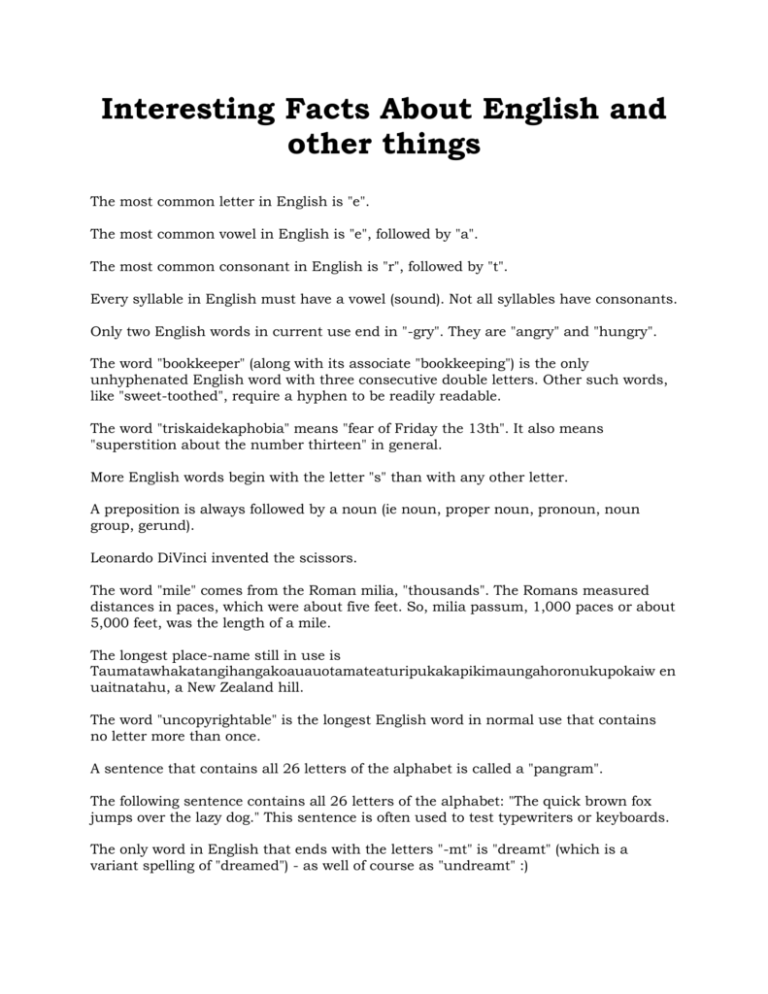
Interesting Facts About English and other things The most common letter in English is "e". The most common vowel in English is "e", followed by "a". The most common consonant in English is "r", followed by "t". Every syllable in English must have a vowel (sound). Not all syllables have consonants. Only two English words in current use end in "-gry". They are "angry" and "hungry". The word "bookkeeper" (along with its associate "bookkeeping") is the only unhyphenated English word with three consecutive double letters. Other such words, like "sweet-toothed", require a hyphen to be readily readable. The word "triskaidekaphobia" means "fear of Friday the 13th". It also means "superstition about the number thirteen" in general. More English words begin with the letter "s" than with any other letter. A preposition is always followed by a noun (ie noun, proper noun, pronoun, noun group, gerund). Leonardo DiVinci invented the scissors. The word "mile" comes from the Roman milia, "thousands". The Romans measured distances in paces, which were about five feet. So, milia passum, 1,000 paces or about 5,000 feet, was the length of a mile. The longest place-name still in use is Taumatawhakatangihangakoauauotamateaturipukakapikimaungahoronukupokaiw en uaitnatahu, a New Zealand hill. The word "uncopyrightable" is the longest English word in normal use that contains no letter more than once. A sentence that contains all 26 letters of the alphabet is called a "pangram". The following sentence contains all 26 letters of the alphabet: "The quick brown fox jumps over the lazy dog." This sentence is often used to test typewriters or keyboards. The only word in English that ends with the letters "-mt" is "dreamt" (which is a variant spelling of "dreamed") - as well of course as "undreamt" :) A word formed by joining together parts of existing words is called a "blend" (or, less commonly, a "portmanteau word"). Many new words enter the English language in this way. Examples are "brunch" (breakfast + lunch); "motel" (motorcar + hotel); and "guesstimate" (guess + estimate). Note that blends are not the same as compounds or compound nouns, which form when two whole words join together, for example: website, blackboard, darkroom. The word "alphabet" comes from the first two letters of the Greek alphabet: alpha, bēta. The dot over the letter "i" and the letter "j" is called a "superscript dot". The word "idiot" was once used to describe an ordinary person; it gradually came to mean a layman, as contrasted with a clergyman. Since few outside the clergy were educated, the term became associated with an uneducated and hence ignorant and foolish one, and eventually became associated with a mentally deficient person If we place a comma before the word "and" at the end of a list, this is known as an "Oxford comma" or a "serial comma". For example: "I drink coffee, tea, and wine." Some words exist only in plural form, for example: glasses (spectacles), binoculars, scissors, shears, tongs, gallows, trousers, jeans, pants, pyjamas (but note that clothing words often become singular when we use them as modifiers, as in "trouser pocket"). The shortest complete sentence in English is the following. "I am. Venus is the only planet that rotates clockwise. Apples, not caffeine, are more efficient at waking you up in the morning." The word "Checkmate" in chess comes from the Persian phrase "Shah Mat" meaning "the king is helpless". We pronounce the combination "ough" in 9 different ways, as in the following sentence which contains them all: "A rough-coated, dough-faced, thoughtful ploughman strode through the streets of Scarborough; after falling into a slough, he coughed and hiccoughed." The longest English word without a true vowel (a, e, i, o or u) is "rhythm". In the course of an average lifetime you will, while sleeping, eat 70 assorted insects and 10 spiders. Most lipstick contains fish scales. The only planet not named after a god is our own, Earth. The others are, in order from the Sun, Mercury, Venus, [Earth,] Mars, Jupiter, Saturn, Uranus, Neptune. There are only 4 English words in common use ending in "-dous": hazardous, horrendous, stupendous, and tremendous. We can find 10 words in the 7-letter word "therein" without rearranging any of its letters: the, there, he, in, rein, her, here, ere, therein, herein. The "QWERTY keyboard" gains its name from the fact that its first 6 letter keys are Q, W, E, R, T and Y. On early typewriters the keys were arranged in such a way as to minimize the clashing of the mechanical rods that carried the letters. No word in the English language rhymes with month. "Dreamt" is the only English word that ends in the letters "mt". The word "set" has more definitions than any other word in the English language. "Underground" is the only word in the English language that begins and ends with the letters "und." The longest one-syllable word in the English language is "screeched." There are only four words in the English language which end in"-dous": tremendous, horrendous, stupendous, and hazardous. The longest word in the English language, according to the Oxford English Dictionary, is pneumonoultramicroscopicsilicovolcanoconiosis. The only other word with the same amount of letters is pneumonoultramicroscopicsilicovolcanoconioses, its plural. There is a seven letter word in the English language that contains ten words without rearranging any of its letters, "therein": the, there, he, in, rein, her, here, here, ere, therein, herein. February 1865 is the only month in recorded history not to have a full moon. No words in the English language rhyme with orange, silver or purple. 'Stewardesses' is the longest word that is typed with only the left hand. If the population of China walked past you in single file, the line would never end because of the rate of reproduction. To "testify" was based on men in the Roman court swearing to a statement made by swearing on their testicles. The combination "ough" can be pronounced in nine different ways. The following sentence contains them all: "A rough-coated, dough-faced, thoughtful ploughman strode through the streets of Scarborough; after falling into a slough, he coughed and hiccoughed." The verb "cleave" is the only English word with two synonyms which are antonyms of each other: adhere and separate. The only 15 letter word that can be spelled without repeating a letter is "uncopyrightable." «No words in the English language rhyme with orange, silver or purple.» Almonds are members of the peach family. The symbol on the "pound" key (#) is called an octothorpe. A pregnant goldfish is called a twit. Emus and kangaroos cannot walk backwards, and are on the Australian coat of arms for that reason.
